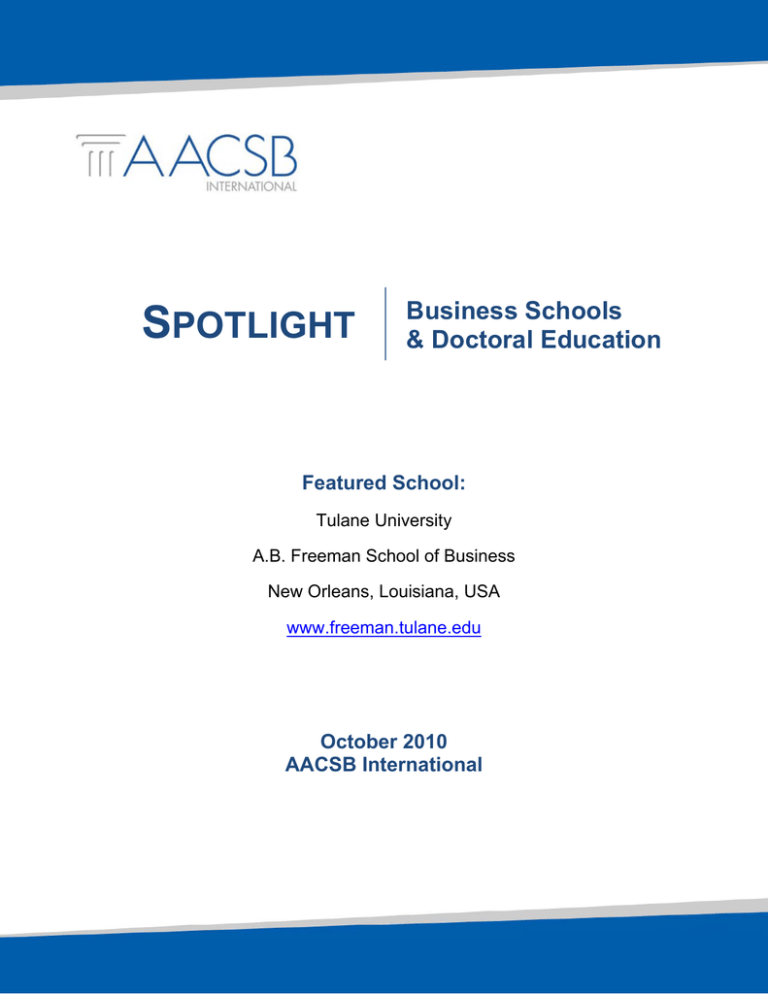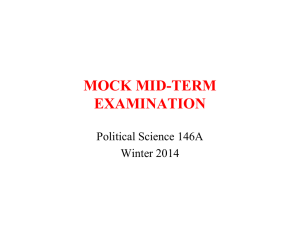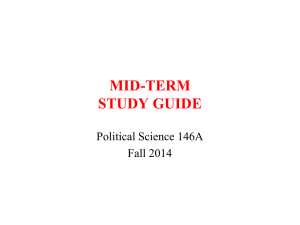
SPOTLIGHT
Business Schools
& Doctoral Education
Featured School:
Tulane University
A.B. Freeman School of Business
New Orleans, Louisiana, USA
www.freeman.tulane.edu
October 2010
AACSB International
SPOTLIGHT | Business Schools & Doctoral Education
Tulane University | 2
The Tulane Latin American Faculty Development PhD Program
Now in its 16th year of operation, the Tulane Latin American Faculty Development PhD Program is
designed to offer experienced, working faculty in Latin American business schools the opportunity to
advance their careers with doctoral-level research degree training, while retaining their teaching positions.
Since 1994, Tulane University’s Freeman School of Business has partnered with one or more prominent
Latin American business schools at a time to create cohorts of teaching faculty with master’s degrees,
who are motivated to enhance both their home institutions and themselves. Past and current partner
schools include: Instituto de Ensino e Pesquisa (INSPER) in Brazil; Universidad de los Andes,
Universidad del Norte, and Universidad ICESI in Colombia; Escuela Superior Politécnica Del Litoral
(ESPOL) in Ecuador; Universidad Francisco Marroquín in Guatemala; Instituto Tecnológico Autónomo de
México (ITAM) and Instituto Tecnológico y de Estudios Superiores de Monterrey (ITESM) in Mexico; and
Instituto de Estudios Superiores de Administración (IESA) in Venezuela1,2.
The History of the Program
During the early 1990s, the Freeman School began a process of internationalization with a specific focus
on projects and activities that would generate a significant impact in Latin America, according to Dr. John
Trapani, Executive Director of the Freeman School’s Goldring Institute of International Business. At the
time, there was a dearth of PhD programs in the region that were capable of producing PhD-level
research scholars, and a majority of faculty members had never pursued a doctoral level education. A
program to aid in the creation and development of doctorally-qualified Latin American business school
faculty was identified as a viable high-impact project, particularly when ITESM contacted the Freeman
School in 1993 to request aid in the development of an “in-house” doctoral program for ITESM faculty.
According to Dr. Trapani, 18 experienced ITESM faculty members were selected for the first cohort of
what became the Tulane Latin American Faculty Development PhD Program, which began the following
year. In years to come, a semi-regular pattern would emerge for the program, with the Freeman School
approached by one or more Latin American business schools every two to three years for similar
programs. In several cases, Latin American partner schools have repeatedly contributed faculty members
to new cohorts.
Structure and Format of the Program
The program takes the form of a contractual arrangement between Tulane University and its Latin
American partner(s). The Freeman School only accepts candidates into the program that are nominated
by and able to receive the support of their home institution. Candidates must be experienced, active
faculty members who hold master’s degrees but do not currently hold doctoral degrees. The sponsoring
institution receives a substantial return on its investment in the form of a relatively inexpensive and
© AACSB International. All Rights Reserved.
SPOTLIGHT | Business Schools & Doctoral Education
Tulane University | 3
efficient way to increase the proportion of faculty who are doctorally-qualified, while keeping them on staff
as they complete their degree. Dr. Trapani indicates that having the candidate’s institution funding their
development is essential for the candidates, who can then enhance their professional careers without
disrupting them to pursue a residential PhD program. This arrangement favors the motivated student,
since institutional support is often contingent upon successful completion of the program.
Tulane University considers the Latin American Faculty Development PhD Program to be a full-time
doctoral program, as the candidates have a full course load through at least the first two years of the
program, even though the delivery of the curriculum is done in a format more often associated with
executive education. The curriculum is essentially the same as that offered for students pursuing the
standard full-time doctoral program in business in New Orleans, with concentrations available in
Finance/Accounting, Management/Strategy, and Organizational Behavior.
Courses are offered by Freeman School faculty on the weekends at the candidates’ home institution,
approximately three to four class days per month during the Fall and Spring semesters, according to Dr.
Trapani. When candidates in a given cohort come from multiple institutions, the institutions vote to choose
one among them as the Latin American location for that cohort’s coursework. During each Summer
semester, candidates come to New Orleans to take courses at Tulane University during the program’s
four required seven-week residency periods. Dr. Trapani says this format results in approximately 50-60%
of all coursework being completed at the candidates’ Latin American host institution.
The coursework, comprehensive exams, and dissertation prospectus stages of the program typically
cover a period of three to four years. Cohorts progress through these stages in lockstep, after which
candidates pursue their dissertation research individually, just like standard full-time PhD program
candidates at the Freeman School. Dr. Trapani says the average length of time that individual candidates
spend in the Latin American program is approximately six years, though Freeman School faculty are
working to streamline the process of identifying dissertation topics and beginning the research, in order to
cut this average to below five years. Earlier introduction of database analysis (particularly of financial
databases) and scholarly writing assignments in the curriculum have also been identified as useful ways
in which to aid candidates’ smoother and more rapid progression through the program. The Freeman
School offers English-language training and the support of independent readers to check candidates’
work for technical accuracy as part of the program as well.
Success and Benefits of the Program
The seventh cohort of the Tulane Latin American Faculty Development PhD Program is scheduled to
begin in January 2011, in partnership with ITAM in Mexico. The doctoral candidates of the fifth and sixth
cohorts are currently enrolled in the program, and together they include over 30 candidates from eight
different Latin American partner institutions3. Including those currently enrolled, a total of 110 candidates
© AACSB International. All Rights Reserved.
SPOTLIGHT | Business Schools & Doctoral Education
Tulane University | 4
have been enrolled over the life of the program, and 68 have graduated so far, according to Dr. Trapani.
He attributes the program’s low attrition rate to several factors, in particular the rigorous selection
process, efficient incentive structure, and support from the home institutions of the candidates.
The enthusiastic support of Tulane’s faculty has also been an essential factor in the success of the Latin
American Faculty Development PhD Program, according to Dr. Trapani. Due to the added capacity needs
of supporting the students in the program’s cohorts, Freeman School faculty are hired to participate in the
program on an overload basis. Dissertation advising and mentorship are spread around the Freeman
School faculty as evenly as possible, but Dr. Trapani says that there are three or four faculty members in
each disciplinary area that are willing to take on a heavy dissertation load. He characterizes most faculty
members involved in the program as highly satisfied and appreciative of the things they gain from their
participation, particularly travel opportunities, exposure to diverse international experiences, and extra
compensation.
Tulane University, and the Freeman School in particular, have realized a number of benefits from running
the Latin American Faculty Development PhD Program. The Freeman School, says Dr. Trapani, benefits
greatly from the internationalization of its own faculty, and the broadened opportunity to showcase the
research capabilities of Freeman School PhD alumni. Since the standard full-time PhD program takes in
only about six candidates every other year, the Latin American Faculty Development PhD Program
significantly increases the total number of doctorally-qualified research faculty with degrees from Tulane
University.
The network of graduates also creates a multiplicity of contacts for Tulane in the Latin American region,
particularly since, as Dr. Trapani notes, nearly half of all graduates of the program have been chosen by
their institutions to move up to administrative positions, such as program directors and deans. Indeed, the
deans of ESPOL, Universidad de los Andes, ITESM’s Estado de Mexico and Santa Fe campuses, and
the Academic Vice-Rector of ITESM-sponsored Universidad TecMilenio all are alumni of the Latin
American Faculty Development PhD Program4. Many of the program’s partner schools listed above also
take part in Tulane’s Latin American Research Consortium (LARC), founded in 1995 with the purpose of
promoting scholarly research on Latin American markets and business institutions. LARC’s annual
meetings, as well as the Dean’s Workshop begun in 2007, provide deans of business schools in Latin
America a forum to share their programs and initiatives in management education5, as well as
opportunities for continuing professional development for program alumni.
Finally, there is the satisfaction of knowing that the program has helped to build quality and capacity
among Latin American business schools. While historically the program has been aimed at strengthening
the capacity of partner schools that already were among the most well regarded business schools in the
region, Dr. Trapani indicates that the Freeman School is looking to broaden its base of partner schools,
seeking out those that may be less well known, but which have the desire and potential to hold
© AACSB International. All Rights Reserved.
SPOTLIGHT | Business Schools & Doctoral Education
Tulane University | 5
themselves to international standards. This branching out is seen by the university as especially important
in light of the fact that some of the partner schools, such as ITESM’s EGADE Business School and the
Universidad de los Andes, have now developed high-quality research PhD programs of their own.
Acknowledgements: AACSB International is grateful for the assistance of John M. Trapani III, Professor
of Finance, Martin F. Schmidt Chair in Business and Economics, and Executive Director of the Goldring
Institute of International Business at the Freeman School of Business.
© AACSB International. All Rights Reserved.
SPOTLIGHT | Business Schools & Doctoral Education
Tulane University | 6
End Notes
1
Tulane University, Latin American Faculty Development PhD Program. (2010) About the Program web page. Electronic document, http://www.laphd.com/program.html, accessed October 14, 2010. 2
Tulane University, Latin American Faculty Development PhD Program. (2010) Current Program Candidates web page. Electronic document, http://www.laphd.com/candidates.html, accessed October 14, 2010. 3
Tulane University, Latin American Faculty Development PhD Program. (2010) Current Program Candidates web page. Electronic document, http://www.laphd.com/candidates.html, accessed October 11, 2010. 4
Tulane University, Latin American Faculty Development PhD Program. (2010) Program Graduates web page. Electronic document, http://www.laphd.com/graduates.html, accessed October 11, 2010. 5
Goldring Institute of International Business. (2010) Latin American Research Consortium and Dean’s Workshop web page. Electronic document, http://www.goldringinstitute.com/research_larc.html, accessed October 11, 2010. © AACSB International. All Rights Reserved.






